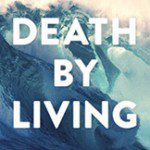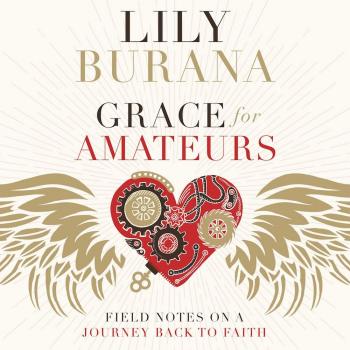Mostly I try to ask questions and shut my mouth and listen and stories come flooding in too many to tell. Everything’s eucharist if you look at it right, seems to me. There’s holy food everywhere.
— Brian Doyle
This month at the Patheos Book Club, we’re featuring The Thorny Grace of It and Other Essays for Imperfect Catholics, by award-winning essayist Brian Doyle. And while Catholics – imperfect and otherwise – will surely adore Doyle’s startling insightful, humorous and profound musings on the lived-out Catholic religious life, the essays have the beauty and power to reach way beyond the Catholic clan, toward spiritual seekers of all stripes. For Doyle captures the glory and grace in the everyday, the minutiae, the relationship, the awkward, the painful, the silly, the strange, with affirming and exquisite beauty. To read his lyrical prose is to soar and to fall, and to soar again on the wings of your heart. Like a master singer delivering her song, Doyle takes you on one heck of a trip with every piece he exhales back into the world. (Read excerpts here.)
We invited Doyle to talk a bit about his work and his faith as part of our Book Club. He reflects on his inspiration, the craft of writing, and how his faith is informed by his wordsmithing.
As a lifelong Catholic, where do you draw your inspiration for your writing?
The profligate silliness and pain and grace and hilarity and miraculousness of the every minute, mostly – “quotidiana,” as my friend the essayist Patrick Madden says. Also kids and animals. Mostly I try to ask questions and shut my mouth and listen and stories come flooding in too many to tell. Everything’s eucharist if you look at it right, seems to me. There’s holy food everywhere.
How would you describe your relationship with God? How does God invigorate or inspire your writing?
I am hugely impressed with the ridiculous generosity and dry humor of the Coherent Mercy. I see the fingerprints and clues and wry puzzles everywhere, even in the painful parts. It’s all a gift, seems to me, and why the gift comes with such pain and horror and loss and grief I do not know. Me personally I suspect that that which we call God needs us to help complete some vast subtle project; I think human beings were given extraordinary gifts of grace and courage and imagination so as to be able to work past violence and revenge toward forgiveness and mercy and humility. I think the point of evolution is to make violence a memory. I think that’s the Plan. I think duress is normal and how we deal with it is who we really are. I think love is the point and arguing about God and who owns God and whose definition of the undefinable is best is stupid and cruel.
The lyrical prose of your essays is indeed like music…. how does the process of writing happen for you? Do you hear the melody first, or the entire symphony at once?
Made me grin. I sort of go note by note and hope to be startled. Mostly I just set out to try to catch a moment, and things spin wildly away. People who cannot stand my writing are always horrified by the playfulness of it, but I love the music of voices and the unspooling of stories, and think humor is holy, and writing that wishes to be real about spirituality had better be alert to humility and play and humor or else it’s merely comment.
What about writing is most life-giving for you?
Connection. At the least, writing is catharsis; it is also a pleasant craft, a happy hobby, a benign neurosis; but at its best it is about saying something that we all feel, catching a story in which the reader and writer stand together for a minute. I am deeply moved by all the letters and notes I get from readers, even the lunatic ones.
What is most challenging about your craft?
Not issuing mere sermon, humility, lecture, advice, comment, fatuous fluff. The only way to write with any bone is to remember you are an idiot. Thank God I have a lot of brothers to remind me.
How has writing informed your faith life?
Attentiveness is the beginning of all prayer, says the great mystic Mary Oliver. I am much more attentive than I might have been if I had never had kids and never been a storycatcher.
What authors do you enjoy reading?
Twain, Orwell, Jan Morris, Mary Oliver, Robert Louis Stevenson, Cynthia Ozick, Helen Garner in Australia, David James Duncan, Barry Lopez, E.B. White, Pattiann Rogers, Annie Dillard, the New Testament in the King James translation (all others are pap compared to that one, seems to me.)
What are you reading now?
Just finished Alice McDermott’s new novel Someone. She’s the best novelist in America, I think, not just the best Catholic novelist. Superb. The best of us since Andre Dubus and Flannery O’Connor and J.F. Powers.
What are you most excited about in your work right now?
Actually in the last few years I have been writing novels and am really absorbed by the long sea voyages they are, so to speak. I love the essay as the coolest form of all but I have to say it’s glorious fun writing doorstop novels.
What is your greatest hope as a writer?
I want to write like people speak, with the swirl and grin and pain and salt and verve of our silly holy voices and hearts. I want to be honest about the church I love for its defiant grace and deep genius and radical countercultural revolutionary insistence on life and love, and which I detest for its greed and corruption and venality. I want to catch all the small moments that are not small. This is why God and Plutarch invented the essay. (Not Montaigne; he was French, and the only good things the French ever invented were the Etch-a Sketch and the bra). I want to speak direct and naked about hilarity and despair. I want to laugh and I want you to laugh with me as forms of snarling prayer against the darkness. I want you to read my essays not because I wrote them but so we can stand together amazed for a moment inside a story, awed and grateful at the gift of What Is.
To read an excerpt from Brian Doyle’s new collection of essays, The Thorny Grace of It, visit the Patheos Book Club here!













